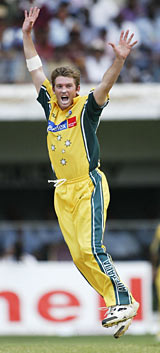Ian Harvey
David Foot
|
|

|
Harvey has now chosen to join Yorkshire, a division below Gloucestershire in 2004 in both leagues, but a club where he has the potential to make a huge difference, once again. In the West, he leaves plenty of memories of his freakish sleight-of-hand skills: whether it was his five cheap wickets - four it seemed from different balls - as Glamorgan were beaten in the 2000 Benson and Hedges Cup final; his prized trio of victims - Alec Stewart, Adam Hollioake and Graham Thorpe - in a quarter-final against Surrey a year earlier; or removing Graeme Hick for a duck in the 2003 C&G Trophy final, when a scorching 61 sealed the match award. "He was a top man, funny, unassuming," said a team-mate. "We're devastated that he's leaving us."
IAN JOSEPH HARVEY hardly conforms to the archetype of the big, loquacious Aussie. He is not particularly tall and his self-confidence is hidden beneath a quiet, amiable exterior. He was born in small-town Wonthaggi, Victoria on April 10, 1972 and completed his education at the local Technical College. As a boy he was more interested in tennis than cricket, which he only took up at 14. Then, with his inherently quirky tendency, he started wicket-keeping and represented Victoria at junior level. His coaches suggested he might try bowling instead.
By 1994-95 he was touring New Zealand with the Australian Academy, and the national selectors, eager for reliable all-rounders, were keen to place faith in him as a one-day player. His colleagues liked his equable personality and healthy thirst. They began to call him "Freak", a reference to his adept and at times unorthodox fielding and ability to throw with either arm, another knack acquired from his Academy days. His progress in Australia was sometimes erratic, but the first season he arrived in Bristol - while other Australians were in England winning the World Cup - Harvey made himself the top wicket-taker in the National League.
His batting has been forceful and entertaining - he won the Lawrence Trophy in 2001 for the summer's fastest hundred, from 61 balls against Derbyshire, and last year smashed the first and only Twenty20 Cup century, off 50 balls. Yet it has been Harvey's bowling that stood out, and some of his changes may well be remembered as mould-breaking. He has experimented endlessly with a quiet perseverance. To deliver six boringly similar balls in an over would be anathema to him. In his Academy days he instinctively concluded that subtle variety brought more success - and was more fun - than brute force. Most effective of all is his slower ball. No one these days can hold it back with more cunning. It was to be the Great Deceiver.
|
|

|
With a fetchingly self-deprecating manner, Harvey would ponder his oddball range of deliveries and say: "At my pace I need to do something different and I've three or four variations that I use. The slow one is my most productive." His easy-going temperament has allowed him to withstand those rare liberties from batsmen who take him on. His reputation for bowling successfully at the death is wholly deserved. "It's something I like, even if I'm going for a few runs. I'm aware of the impact of the final overs when the cricket can become very tense. I try not to let it bother me at all - I back myself."
In the 2003 World Cup, having made useful but not especially decisive contributions throughout, he narrowly failed to make the team for the final. He returned to England and had perhaps his most influential season yet. His simple professional approach may be a product of post-30 maturity and growing contentment. Married to Amanda and with two children, Charlotte and Will, he tells you how his lifestyle has changed. Apart from the odd round of golf, family life is now the perfect therapy. He hints that helping to look after the children is as important to him as magically spiriting up that slower ball, like a rabbit, from his concealed pocket.

